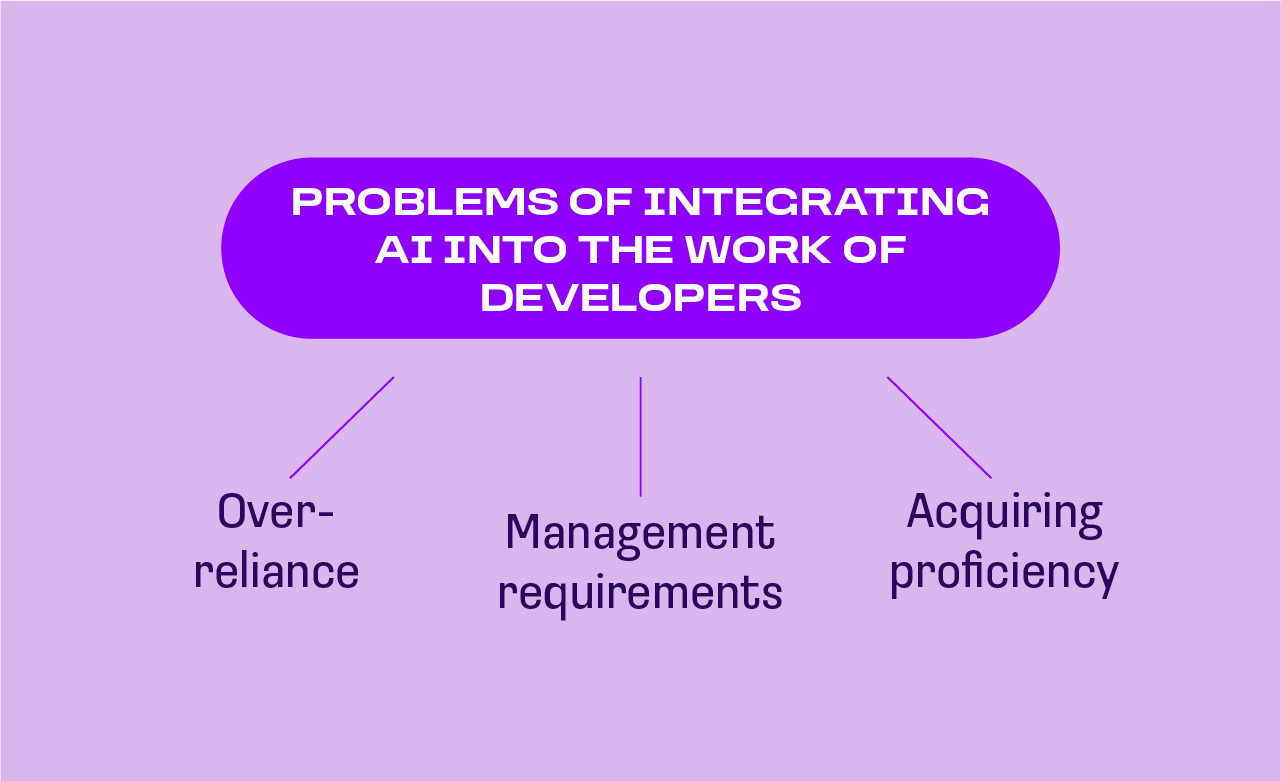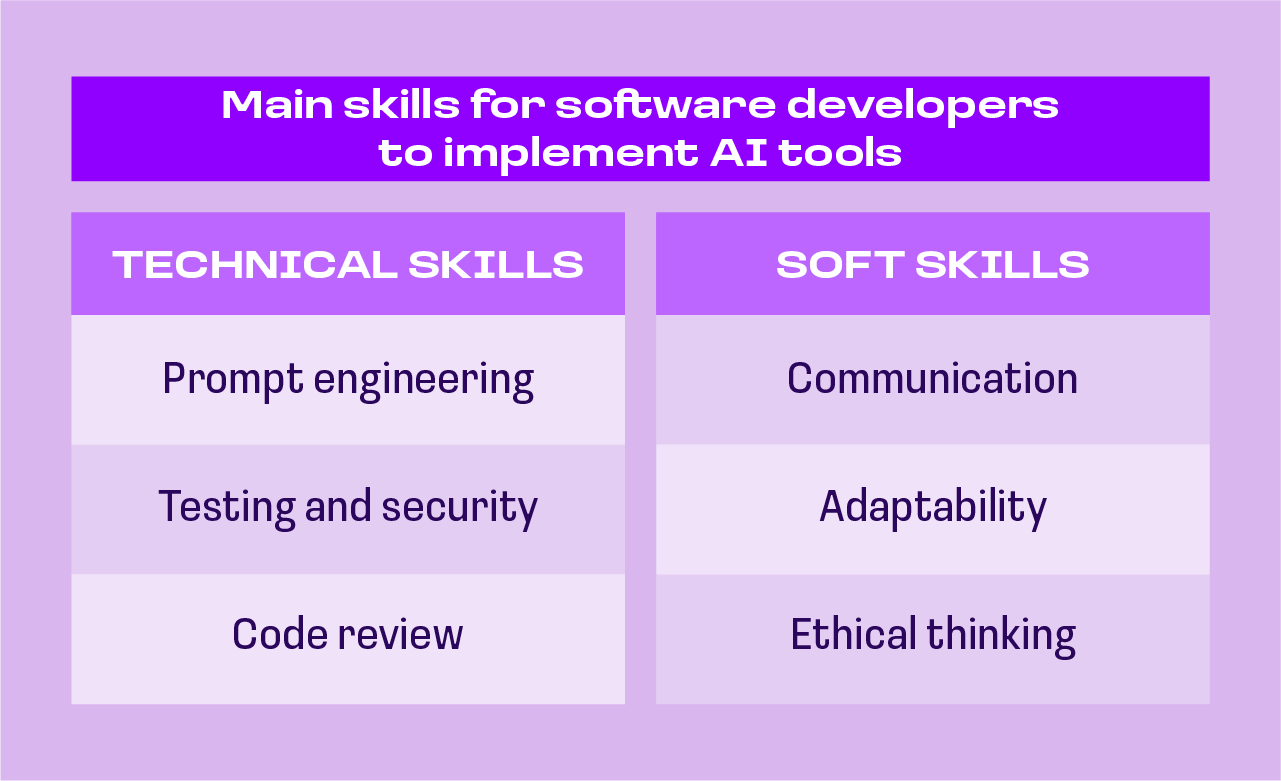The impact of AI on software development: all you need to know for success
The author of this article is tech expert Pieter Murphy. Invited expert — Senior Engineering Manager at EPAM, the creator of AI-Supported Software Engineering course Aliaksandr Trafimenka.

The evolution of software development with AI
The use of AI in software development was always in the future, but not anymore. At first, AI was used for quality assurance and testing tasks. With advancements in technology, it is now deployed throughout the entire software creation process, encompassing everything from requirements gathering to maintenance.
The deployment of AI for developer productivity has centered around using innovation in machine language and natural language processing to automate many tasks in software development.
For example, AI can analyze user requirements and feedback, recognize patterns, generate code templates based on those specifications, predict defects, and create test cases, reducing the time and effort needed for testing.
There are many AI-based software development tools available today. One of these tools is GitHub’s Copilot, which can suggest and generate code snippets based on the requirements and context of the project.
Another AI-driven software tool is DeepCode, which analyzes code and recommends improvements based on patterns and best practices.
Factors influencing AI on software development
Some of the primary factors influencing the use of generative AI in software development include:
Automation
Artificial Intelligence in software development automates repetitive tasks and frees up developers, allowing them to focus on the more complex and creative aspects of development.
Predictive analytics
AI and software engineering are a great combination. AI can anticipate future security and software performance, making it possible to implement preemptive measures to reduce bugs or vulnerabilities and optimize the software.
Data-driven decision-making
AI analyzes large datasets, providing useful insights that guide design and architecture decisions, leading to more robust, user-centric software.
Code generation
AI-powered tools automatically generate code, speeding up prototyping, promoting innovation, and allowing developers to experiment with new ideas quickly and efficiently.
Intelligent application development
AI facilitates the creation of smarter applications such as chatbots, recommendation systems, and personalized user experiences, thus enhancing software functionality.
Problems of integrating AI into the work of developers
While it is clear that AI for software engineering has numerous benefits, its integration still comes with certain challenges that should be addressed. Such problems include:
Management requirements
AI-powered tools can automate certain routine tasks, but some AI systems are complex and may require careful management.
AI software development systems are trained with large datasets whose performance needs to be monitored, which increases the developer’s workload and requires them to have additional skills.
Acquiring proficiency
Another problem with adopting advanced AI tools is that they require some learning. The development team needs to put in time and effort to effectively use AI tools.
For smaller teams, this requirement can prove burdensome and may slow down the development cycle, even if it will increase efficiency in the long run.
Over-reliance
Relying heavily on AI for software development may leave developers in a bind. They still need to fully understand the logic behind certain tasks performed by AI tools, such as code generation and debugging.
This will help them to solve unexpected issues that may arise that require a thorough understanding of the code.

I wondered, “How will AI change software development?” To that end, I asked Trafimenka how developers are adapting to the impact of AI.
Here’s what he had to say:
“The adaptation of developers to the AI impact on software development varies, but overall, the trend is positive. Many developers are integrating AI tools into their workflows and appreciating the efficiency and productivity these tools offer.
AI helps automate repetitive tasks, suggest code snippets, and identify potential bugs, significantly reducing development time and improving code quality.
However, the transition isn't without challenges. Some developers may initially be skeptical or resistant, concerned about the accuracy of AI-generated outputs or the potential impact on their roles.
There's also a learning curve associated with understanding how to use AI tools effectively and integrate them into existing processes. Educational resources like the "EngX AI-Supported Software Engineering" course, are crucial in easing this transition.
By providing comprehensive training on how to leverage AI effectively, these courses help developers build confidence in using AI tools. Over time, as developers become more familiar with and see the benefits of AI, their adaptation becomes smoother and more common.
Moreover, the collaboration between human intelligence and AI is key. AI tools are designed to support human capabilities, not replace them.
Developers who understand this partnership and learn to use AI as a supportive tool rather than a replacement tend to adapt more easily and benefit the most from these technologies.
In summary, while there are initial challenges, developers are increasingly adapting to AI’s impact because it enhances productivity and code quality. With the right training and mindset, integrating AI into software development becomes a natural and beneficial progression.”
Main skills for software developers in the background of the impact of AI
In the age of AI, software developers need certain technical and soft skills to implement AI tools. They need the technical skills to implement AI in software engineering and make the most out of them, but they also need soft skills to collaborate seamlessly with others and create solutions.
Technical skills
Prompt engineering
This involves creating well-designed instructions or prompts that guide AI’s behavior to produce the desired responses or outputs.
AI coding assistants can sometimes fail to generate valuable output, which can be pretty frustrating. However, innovation in prompt engineering can help you learn how to communicate with AI to get the best answers.
Testing and security
Using AI in software development makes it easier to generate and automate tests. However, developers still need strong foundational knowledge of security best practices, testing principles, and programming skills.
Artificial intelligence in testing helps software engineers analyze and interpret tests effectively to identify biases or potential limitations. When augmented with human testing expertise, they can be leveraged to achieve more than would be possible with conventional tools.
Code review
AI and software development are useful combinations but not perfect. AI might generate code that contains logic flaws, syntax errors, or other mistakes. That is why software developers need code review skills to make sure they’re not pushing faulty code into production.
Soft skills
Communication
Developers need strong communication skills to collaborate with team members and other stakeholders. Good communication is also important when generating prompts. Prompts need to be well thought out, direct, and clear.
Adaptability
AI is a rapidly advancing technology, so software developers need to be adaptable to new frameworks, methodologies, and tools. They need to develop a mindset that lets them learn constantly and stay up to date with the ever-evolving AI tools.
Ethical thinking
When it comes to AI, developers should be able to consider issues such as privacy, transparency, fairness, and bias.

The future of AI for software development
Looking into the future, experts say AI is set to become the foundation for many software solutions, boosting productivity across different business processes and industries. This key role will transform software development, focusing more on platform thinking instead of the usual outcome-based design.
The rise of AI tools might lead to a more open approach to software development where people without technical skills can help with coding through easy-to-use platforms. This shift could help solve the skilled worker shortage in the field. Among these innovations, WriteHuman AI could emerge as a significant tool, enhancing how content is created and integrated within software applications. It's important to note that these AI tools, including ChatGPT, are not meant to be a ChatGPT replacement for human developers. Instead, they are designed to augment human capabilities
Some experts think that by 2040, AI might take over many human coding jobs. However, most specialists agree that while AI will change how software is made, human developers will still be needed to solve tricky problems and ensure everything fits the big picture.
According to Trafimenka, “The EngX course is designed to arm developers with a suite of highly practical skills that are immediately applicable to their work. Let me give you a sense of what they can expect to learn.
First, developers will master prompt engineering. This is the art of crafting questions and commands to get the best responses from AI models. It’s like learning to communicate fluently with the AI, ensuring that they can harness its full potential.
They’ll also hone their critical thinking and problem-solving skills. By using AI tools for task research and analysis, developers will be able to tackle complex problems with data-driven insights, enhancing their ability to think critically about the issues at hand and find effective solutions.
The course will teach them how to achieve consistent solutions. Whether they’re creating new methods, classes, or entire modules from scratch, developers will learn techniques to streamline these processes, making them more efficient and reliable.
When it comes to coding, developers will be able to complete and review code with GenAI. They’ll understand how to leverage AI to generate code snippets, review existing code for potential improvements, and ensure their code is of the highest quality.
Quick and granular troubleshooting and code debugging with GenAI is another key skill. Developers will learn how to quickly identify and fix issues in their code, using AI to provide detailed insights and solutions, turning what could be time-consuming tasks into quick fixes.
The course also covers automatic documentation with GenAI. Creating detailed and accurate technical documentation will become effortless, with AI helping to ensure that all necessary information is captured and organized.
Lastly, developers will become proficient in creating fast, accurate user stories with GenAI. This will enable them to quickly generate user stories that are clear, concise, and accurately reflect the requirements of their projects”.
Learn to effectively use AI in software development in the course from EngX
Engineering Excellence (EngX) started in 2014 to tackle the everyday problems developers, teams, and projects face. It gives software engineers the products, tools, and services they need to boost their software development output.
The EngX AI-Supported Software Engineering course aims at engineers who want to learn how to use AI to increase developer output. This course teaches the basics of large language models (LLMs), covering ideas like AI, ML, NLP, and LLMs.
It offers hands-on training on using AI tools like ChatGPT and GitHub Copilot. These tools help with coding tasks, writing project docs, creating prompts, testing code, and improving software development speed.


.png)
